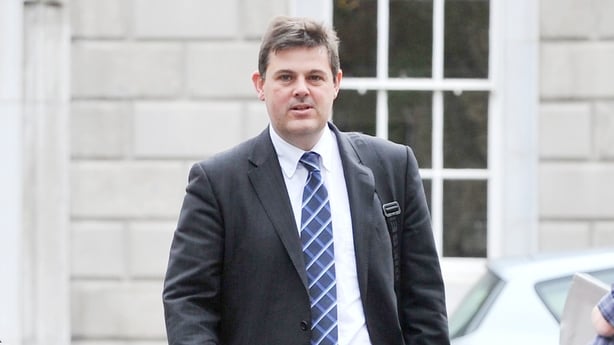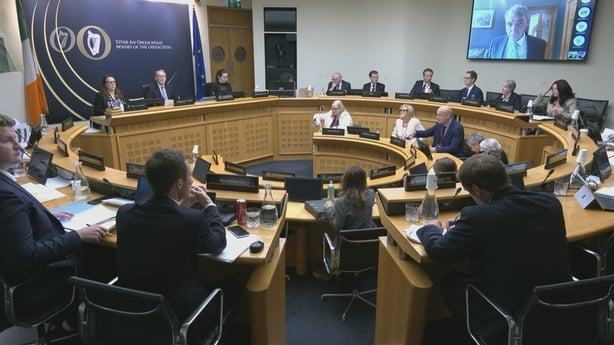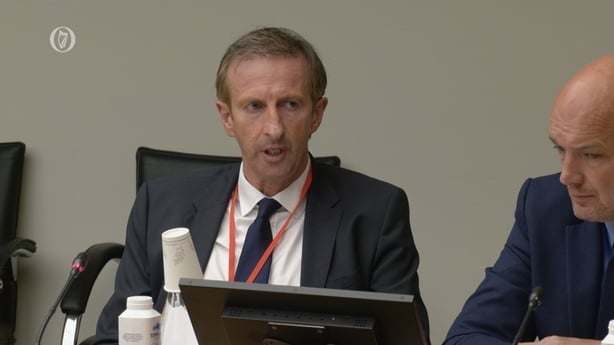In recent days there has been one phrase which has echoed through the myriad of news reports and political commentary on the RTÉ crisis: "a failure of corporate governance."
It has been referenced by board members and senior managers in RTÉ, ministers, Oireachtas Committee members, and a slew of newspaper columnists.
The Government has now agreed to establish a review of governance and culture at RTÉ.
But, how should corporate governance have functioned in RTÉ, and what are the failures that should be looked into by the appointed experts?
The focus of any review into the RTÉ secret payments controversy should be on the basic question of 'why didn't this come to light sooner?' according to Conor Power SC, a barrister with expertise in administrative law.
"It is obvious that there was a change to the auditing practices such that the issue was identified, which is to the credit of Chief Financial Officer, Richard Collins," according to Mr Power.
He says additional questions which government appointed experts might want to ask are:
"How could the previous system have been devised and operated without - it seems - adequate audit oversight?"
"How could it be that such a sensitive issue could persist over a number of years and not be brought to the attention of the RTE Board?"
A starting point for the government appointed experts will be the Code of Practice for the Governance of State Bodies, and the Broadcasting Act 2009 which provide the corporate governance framework for RTÉ.
The Code states that the Board and Management are "accountable for the proper management of the organisation" and should act "prudently, ethically and with transparency."
They should also "provide value for money" for taxpayers and manage risk appropriately.
In RTÉ, "the Board" is the RTÉ Board which meets monthly and is largely made up of independent people from business and the media world outside of RTÉ.
"The Management" is the Executive Board. It manages the organisation day-to-day and is comprised of nine of the most senior employees of RTÉ, led by the Director-General.
So, who is responsible for what in relation to corporate governance, and the apparent failures that have emerged?
Corporate governance required of the RTÉ Board
According to the Code of Practice, the chief responsibility of a Board is "leading and directing the State body’s activities" within "a framework of prudent and effective control."
The other main responsibility is to hold "the CEO and senior management to account for the effective performance of their responsibilities."
Notably, the Board "may delegate particular functions to management, but the exercise of the power of delegation does not absolve the Board from the duty to supervise the discharge of the delegated functions."
This means that the ultimate responsibility for what happens, or doesn’t happen, within RTÉ rests with the RTÉ Board, according to Gabriel D'Arcy.
Mr D'Arcy is a former managing director at Bord na Móna, a Chartered Director, and an experienced board chair.
However, "it appears that transparency and openness did not exist between the RTÉ Board and the Executive Board," he said.
"That will be the focus of the incoming Director-General Kevin Bakhurst," he added.
Kevin Bakhurst is due to take up position as DG of RTÉ on July 10.
With the payments controversy on-going last week, Mr Bakhurst said his plans include a "reconstituting" of the Executive Board.

Mr D'Arcy believes that confusion around the responsibilities of the Executive Board has contributed to the governance issues which have emerged recently.
The Code of Practice for State Bodies states that "the [executive] Management... has a duty to provide the Board with all necessary information to enable the Board perform their duties to a high standard."
Gabriel D'Arcy says knowledge – even if only "partial knowledge" - was retained at Executive Board level that should have been passed on to the RTÉ Board.
During Oireachtas Committee hearings last week, it was stated that because senior executives operated in a 'siloed' manner, many only had partial knowledge of the so-called tripartite deal between RTÉ, Ryan Tubridy and Renault, which led to the controversial payments being made in 2022 and the use of the now widely discussed barter account for commercial payments.
At the hearings, Moya Doherty, who chaired the RTÉ Board until November 2022, said neither she nor her RTÉ Board colleagues were aware of the existence of a barter account within RTÉ during their tenure, something she called "staggering".
Current Acting Deputy Director-General Adrian Lynch accepted there were problems with the function of the Executive Board.
"In terms of corporate governance and an integrated executive working a functional way, I would say that is an issue," he told Oireachtas Committee members.
The current chair of the RTÉ Board, Siún Ní Raghallaigh, also expressed similar concerns. She blamed the "culture and the environment that the executive board is operating within" as the reason for a "complete lapse of corporate governance".
But any governance and culture review by appointed experts is likely to go beyond the operation of the Executive Board.
It is also likely to focus on how the payments arose in the first place, which the RTÉ Board has a key function in overseeing.
RTÉ Board’s specific duty on major contracts
The controversial payments arose out of a deal made on Ryan Tubridy’s behalf by his agent, NK Management, in addition to his ordinary contract of employment. It was agreed as part of his contract negotiations.
According to the Code of Practice for State Bodies, among a Board’s responsibilities are "the approval of terms of major contracts."
To carry out this function, a sub-committee of the RTÉ Board known as the Remuneration and Development Committee, was set up in 2014.
Under its terms of reference, it has a duty to "consult with the "Director-General in relation to 'top talent' contractor contracts" and it is obliged "to meet at least once a year."
As the highest-earning presenter within RTÉ for many years, Ryan Tubridy’s contract was a 'top talent' contract.
The Grant Thornton report said "in early 2020, RTÉ began discussions around [Mr Tubridy's] contract renewal."
At that time, Moya Doherty chaired both the RTÉ Board and its remuneration sub-committee.
She said she discussed with "Dee [Forbes] regularly the negotiations with Ryan Tubridy."
However, she said, the Remuneration Committee didn't meet in March 2020, or for the rest of that year, due to personal illnesses and the Covid-19 pandemic. This was the first year of the pandemic and many ordinary business practices everywhere went on hold.
In retrospect, this was an important period for the oversight of the RTÉ Board and its Remuneration Committee.
The discussions around Mr Tubridy's contract ultimately led to the brokering of the tripartite arrangement with Renault and the guarantee by RTÉ to underwrite it.
It is important to note that there was no wrongdoing by Mr Tubridy in relation to the deal, the controversy surrounds the lack of transparency about the deal to the public and the Oireachtas.

Internal Controls
Another area of review which any appointed corporate governance experts may focus on is the "systems of internal control" at RTÉ and its obligation to take "steps to ensure an appropriate control environment".
Last week, RTÉ chair Siún Ní Raghallaigh said that a review of internal controls by the RTÉ Board was already under way.
"This series of events has revealed grave failings in internal controls at RTÉ. Nothing less than an overhaul of such controls and work practices will suffice, and the Board will oversee this process," she said.
Evidence at the Oireachtas hearings revealed that in certain instances the internal control was the simple direction of the former Director-General Dee Forbes.
Geraldine O'Leary, RTÉ’s Commercial Director, said that she acted on instruction from Ms Forbes when she paid invoices via the barter account, though she was "not aware of how it fitted in with the overall deal" for Mr Tubridy’s payment.
At the time of payment, the transactions "rested outside the normal internal control system" and "the commercial team would have processed transactions through the account without seeking advance approval from Finance," according to Grant Thornton.
In this context, it is important to note that the Broadcasting Act "gives primacy to the role of the Director-General as regards accounts but involving ultimate oversight by the RTÉ Board."
According to Conor Power SC "it is reasonable for staff within RTÉ to defer to the Director-General's views."
He said the position of the DG in law "is a very strong one" involving "executive governance of RTÉ on a day-to-day basis."
However, he said, the RTÉ Board should "operate proper internal polices such that by the time the 'say so' of the Director General becomes operative, sufficient internal checks and balances on the accounting regime have been completed."
"Ultimately this did occur within RTÉ" but not due to "on-going structural checks," he said.
The issue came to light during a routine audit, according to RTÉ.
What worked?
An expert review of RTÉ internal controls is likely to look for evidence that management adhered to the Code of Practice, which applies to all State bodies and requires that steps are taken "to ensure an appropriate control environment" operates and that there are "clearly defined management responsibilities and evidence of reaction to control failures."
The Grant Thornton report provides evidence of improvements made to internal controls by the current Chief Financial Officer, Richard Collins. It noted that Mr Collins is recorded as having detected the barter account and brought it "onto the balance sheet" in 2020, although it "still rested outside the normal internal control system."
After the barter account was brought onto the books, the two controversial €75,000 transactions in 2022 became visible to auditors, Deloitte, earlier this year.

Evidence given to the Oireachtas Committees also suggests that the RTÉ Board’s Audit and Risk sub-committee reacted promptly when alerted to the existence of unusual payments.
The Audit and Risk Committee (ARC) is chaired by businesswoman Anne O'Leary, and reports to the wider RTÉ Board.
She described to the Oireachtas Media Committee her reaction to the receipt of concerns from auditors Deloitte about payments, on March 17 this year.
Ms O'Leary explained that Deloitte had received "no real explanation for [the payments], and that bothered me, so I thought that I needed to put in Grant Thornton to take a look at it."
Within two days, she had informed the other ARC members, and the RTÉ Board.
The problem with 'deceit'
Speaking at the Public Accounts Committee on Thursday, Wexford TD Verona Murphy said that "no system of checks and balances can detect deceit."
Given that the way the controversial payments were presented as "an act designed to deceive," according to the Chair of the Board, Siún Ní Raghallaigh, is it fair to say that they should have been detected?
Gabriel D'Arcy said the weaknesses shown at executive board level should be addressed by the incoming Director-General, Mr Bakhurst.
He said Mr Bakhurst "should go further by disbanding the Executive Board altogether and replacing it with an appropriately skilled and balanced 'executive' management, leadership team."
Penelope Kenny, a corporate governance consultant, believes that this saga has a long way to go, and that it is too early to make suggestions or decisions until the extent of the issues are known.
"The first step is to be satisfied that the organisation and its stakeholders understand all aspects of what exactly is going on in RTÉ," she said.
Conor Power SC said important changes may arise from the controversy.
"There are now legal protections available to whistleblowers, one lesson may be to empower relevant staff to speak out directly."
"Another may be to examine the role of the Director-General," he said.
"At present [that role] is a powerful one that involves not only day-to-day operation, but also editorial control. The pay of the organisation's most famous stars crosses both of those functions in a very particular way."







